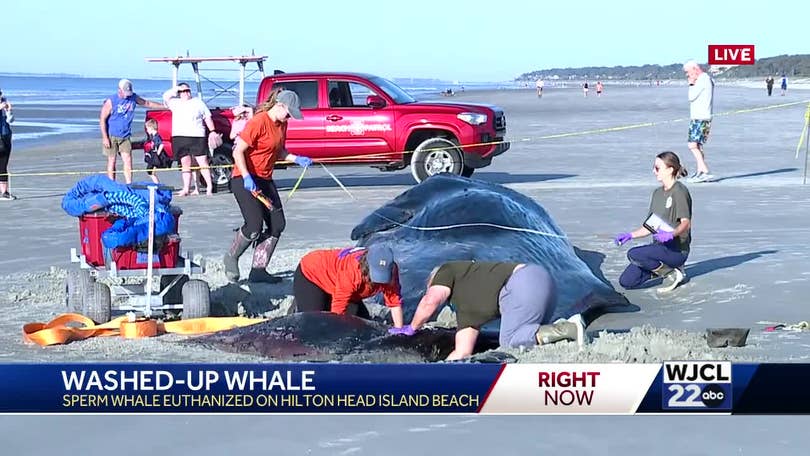Beached whale on Hilton Head Island euthanized
The whale was euthanized Sunday night

Monday update: The whale was euthanized Sunday night.
An autopsy has been planned.
There's no word at this time as to what will happen with the corpse.
Sunday update 12:20 p.m.: According to the Town of Hilton Head, the whale will, unfortunately, need to be euthanized.
"The whale is still alive, and trained professionals, including NOAA and marine mammal experts, are on-site doing everything possible to keep it comfortable," then town wrote in a Facebook post.
"When whales beach themselves, it’s often because they are already seriously ill or injured. In this case, euthanasia has been determined to be the most humane option. However, the specific type and amount of euthanasia medication required is not something that’s readily available and is currently being transported from Florida. A highly experienced veterinarian from the Georgia Aquarium is also en route to perform the procedure.
We understand how difficult this is to witness, and we appreciate the community’s compassion and patience. Please continue to respect the perimeter and give responders the space they need.
We will continue to share updates as we receive them."
Initial report:
The South Carolina Department of Natural Resources is assisting after a whale washed ashore on Hilton Head Island on Saturday.
The above video was captured by Shore Beach Service.
The sperm whale is located near the Marriott Grand Ocean resort, near Coligny Beach Park.
Sperm Whale Fast Facts:
- They are the largest toothed predator
- There are approximately 300,000 sperm whales currently in existence
- Adult male sperm whales typically reach 49 to 59 feet and weigh 35 to 45 tons
- Females average 33 to 40 feet and weigh 14 to 18 tons
- Their lifespan is typically 60 to 70 years
- They are the largest toothed predator
- There are approximately 300,000 sperm whales currently in existence
- Adult male sperm whales typically reach 49 to 59 feet and weigh 35 to 45 tons
- Females average 33 to 40 feet and weigh 14 to 18 tons
- Their lifespan is typically 60 to 70 years


No comments:
Post a Comment